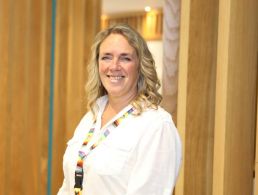Cathy Donnelly, senior director of talent at Liberty IT, spoke to Siliconrepublic.com about the future of work and human resources.
An area that will undoubtedly be transformed in the future of work is human resources. Siliconrepublic.com took the opportunity to speak to someone who could give us valuable insights into what we might expect.
Cathy Donnelly, senior director of talent at Liberty IT, gave us a window into the predictions she has made based on her own experience in the industry.
Benefits that go beyond the salary
A potentially positive aspect of the future of work are the benefits beyond salaries. The more that our workloads evolve, so too do the needs of employees, and companies of the future will need to keep up in order to retain staff.
“I think the pace of growth in salaries will max out in the future – it’s not sustainable and, if it continues, we will start to see organisations being pushed out as they simply won’t be able to compete for talent,” Donnelly said.
“That said, I am of the opinion that whilst a competitive salary is essential, work is about much more than the money. We could all cut our benefits packages and pay our employees more, but it’s the benefits packages which allow us to differentiate as tech employers.”
‘For me, it’s simple – focus on outcomes and not on hours worked’
– CATHY DONNELLY
When it comes to attracting the best talent and keeping it in-house, Donnelly believes that culture, respect and brand each play an important role.
“Many years ago, I heard someone say ‘recruit with reputation, retain with reality’, and that has stuck with me. A strong employer brand is essential to attract the talent in the first instance – potential employees are looking for opportunities to use exciting and emerging technologies and solve real business problems with technology.
“They want a great place to work where their manager really cares about them, they have the opportunity for two-way dialogue, the strategic vision excites them, and the values of the organisation are living and breathing.”
A nugget of advice she offers here is around brand ambassadors. They can help a company tell its story in both internal and external environments.
Work-life balance in the future
Coming from a human resources perspective, Donnelly is well-accustomed with the widespread struggle to achieve work-life balance. And as someone with a front-row seat to HR developments, she has a simple mantra: “Focus on outcomes and not on hours worked.”
“As a leader in Liberty IT, I role-model the behaviours I want to see within my team and the leaders within my team do likewise with their teams,” she continued.
“We don’t set up meetings outside of working hours, we don’t encourage ‘presenteeism’, we encourage employees to work from home and to leave early when they have had a long week. We spend time together and get to know each other, which naturally means we support each other with our work-life balance.
“Of course, we also have a full range of flexible working options. Some choose to have formal arrangements, but we create that flexible and non-judgmental environment where employees feel empowered to work as best suits them without the need for formal agreements.”
‘Diversity and inclusion make us better. The variety of views, ideas and opinions make us more innovative and creative’
– CATHY DONNELLY
Diversity and inclusion
According to Donnelly, diversity is a two-way street when it comes to the promise it can bring to a business.
“Diversity and inclusion make us better. The variety of views, ideas and opinions make us more innovative and creative,” she added.
“The business case is clear – those businesses that embrace diversity and inclusion gain higher market share and have a competitive edge in accessing new markets. It’s critically important for us in Liberty IT, as we work across the globe.”
She described the training initiatives that Liberty IT has begun to provide for its employees, which cover such topics as cultural dexterity, where employees learn about themselves and how they like to work, and can compare that with those of other employees from different backgrounds, cultures and countries.
“It has already opened up lots of rich discussions about how we can best build true and long-lasting partnerships and relationships,” she added.
Something that will likely increase in significance as the future of work becomes a reality, Donnelly said, is age diversity.
Retirement age is set to go up as people are living for longer. We need to make sure, she emphasised, that we continue to support the older generations still in employment, and that we harness their wisdom and experience to benefit those following in their footsteps.
“I think age diversity will become much more significant in the coming years as we see people working and retiring later. For organisations, the question is: how do we best support people who remain in our employment whilst ensuring we share their experience and expertise with newer and younger employees? Retirement at age 55 or 60 will soon be a thing of the past,” she said.
In terms of the immediate future, though, Liberty IT is prepared to continue its work on inclusion for all its staff.
Donnelly concluded: “Recently, Liberty IT was awarded a Diversity Charter Mark in recognition of the work undertaken to date, which I am delighted about and I look forward to supporting more activities in the months to come!”




